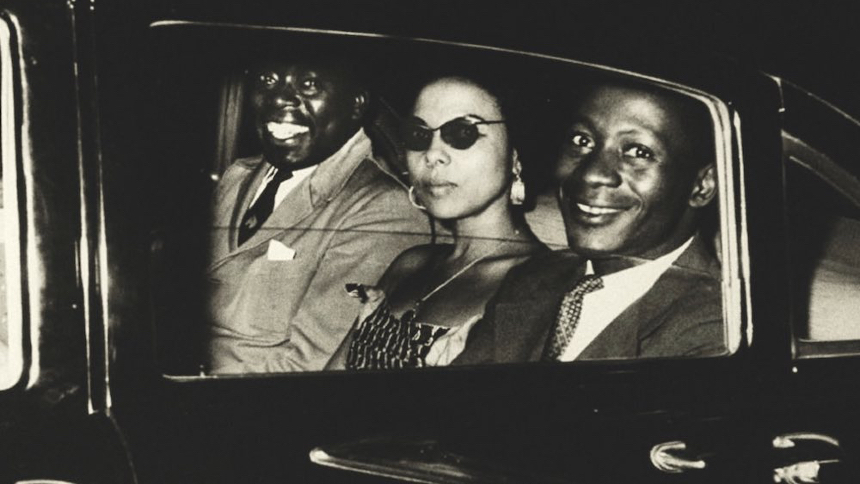SOUNDTRACK TO A COUP D'ETAT Review: Invigorating, Infuriating Documentary Epic

Like much of the jazz that soundtracks it, Soundtrack to a Coup d'Etat doesn't hold your hand.
From the start, the film unleashes a frenetic, almost overwhelming, visual language. It's a visual language that, along with the phenomenal titular soundtrack, makes the two and a half hour documentary riveting from start to finish.
Archival snippets of musicians accompanied by text informing us of the musicians' names and song titles blast on the screen to introduce the many iconic jazz tracks of the soundtrack. White, thick, block lettered text against black screens offers information, quotes, and statistics from primary and secondary sources, with attributions for quotes in the top left and source citations nestled under the relevant text. Footage from political speeches, television interviews, previously classified recordings, personal home video, and more explicate the history of the Democratic Republic of the Congo's (DRC) "independence" and the beginning of the following "Congo Crisis" in 1960.
Director Johan Grimonprez and editor Rik Chaubet expertly weave together these many elements into an energetic and fascinating, if not immediately legible, narrative tracking the parallel histories of American jazz musicians' relationship with the United States' foreign policy and a detailed history leading up to the Congo Crisis.
From the use of jazz as cultural propaganda to Louis Armstrong's State Department funded tour of Congo (that allowed the CIA to covertly retrieve 1,500 tons of uranium from the region), Soundtrack to a Coup d'Etat shows Black American music co-opted by US statecrafters throughout the Cold War; often unbeknownst to the musicians themselves. But care is also taken to show the firmly anti-US imperialist stance taken by several musicians, with a significant portion of the film dedicated to fleshing out the relationships between Malcolm X, the liberatory movement in the DRC led by Patrice Lumumba, and American jazz musicians. In fact, the film uses a protest at the United Nations led by artists and activists Max Roach and Abbey Lincoln as its start and endpoint, emphasizing the cyclical nature of western imperialism.
The political narrative of the film plays out almost like a thriller as the wealth of archival footage places viewers in the rooms where many of the most important events occurred. And what cannot be shown first hand is either recalled by those who experienced it in secondary archival sources, or communicated via the bold onscreen text. Grimonprez also masterfully deploys silence in the largely soundtracked film, allowing hard cuts from music to silence to add impact to text revealing horrific pieces of history.
At times, the film's net may seem cast too wide in its far-reaching, granular consideration of the factors that contributed to the Congo Crisis. Speeches from household name heads of state including Eisenhower and Khrushchev fill out the narrative, whose key figures are then Secretary-General of the UN Dag Hammarskjöld, Secretary-General of NATO Paul-Henri Spaak, other less than widely known politicians and activists, several spies, some mercenaries, and Lumumba himself, whose assassination inspired Roach and Lincoln's protest. Yet that wide net is the film's greatest strength.
Any "secret history" is necessarily full of names most people have never heard. But it's not the revelations that the US and Belgian governments conspired in funding Congolese opposition to Lumumba and eventually to assassinate him with the implicit approval of the UN that makes Soundtrack to a Coup d'Etat remarkable, it's the attention to why. That the film answers "why?" both historically, with a focus on the Union Minière du Haut-Katanga mining company, and contemporarily, with Tesla and iPhone ads whose sheen contrasts harshly with the archival footage, pushes it beyond a brilliantly constructed piece of historical documentation into meaningful agitprop for today.
Via Kino Lorber, the film enjoys its US theatrical premiere on Friday, November 1 at New York's Film Forum. The documentary made its World Premiere at the 2024 Sundance Film Festival, where it won the Special Jury Award for Cinematic Innovation, and is an official selection of CPH:DOX, IDFA, San Sebastian Film Festival, and BFI London Film Festival. It will also open in Los Angeles on November 15 (Nuart) and Chicago (Gene Siskel Film Center) on November 22.
Soundtrack to a Coup d'Etat
Director(s)
- Johan Grimonprez
Writer(s)
- Johan Grimonprez
Cast
- Fidel Castro
- Louis Armstrong
- Miles Davis







